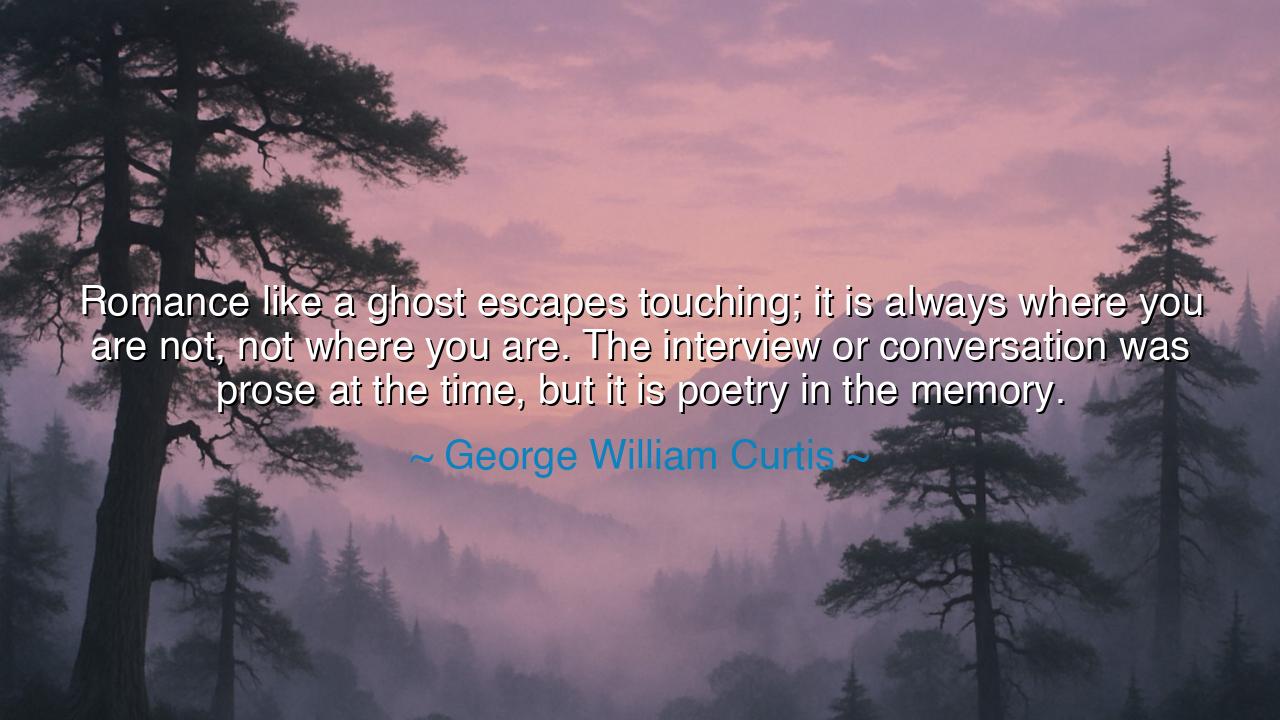
Romance like a ghost escapes touching; it is always where you are
Romance like a ghost escapes touching; it is always where you are not, not where you are. The interview or conversation was prose at the time, but it is poetry in the memory.






The words of George William Curtis shimmer with the haunting beauty of memory: “Romance like a ghost escapes touching; it is always where you are not, not where you are. The interview or conversation was prose at the time, but it is poetry in the memory.” In this reflection, he unveils the fleeting, elusive nature of romance. It does not always dwell in the present moment but in the echo that lingers afterward. What once seemed ordinary becomes extraordinary when viewed through the softened lens of remembrance. Thus, romance is not always felt in the moment, but it rises like fragrance from the past, filling the heart with sweetness long after the words were spoken.
Curtis, a nineteenth-century American writer and orator, lived in a world still steeped in letters, in conversation, in the quiet art of reflection. He knew that when we sit in a room speaking with another, the moment may feel plain, even unremarkable. Yet later, the memory of that same moment can blossom into poetry. The mind, touched by nostalgia and affection, transforms prose into something divine. This is the secret he unveils: romance is not only what we live, but what we remember we have lived.
The ancients would have recognized this wisdom. They too knew that memory sanctifies. Consider the story of Cicero, who after the death of his beloved daughter Tullia, looked back on their conversations and found them elevated beyond the mundane. What had once been simple words exchanged between father and daughter became sacred treasures in his heart. This is exactly what Curtis names: in life it was prose, in memory it became poetry. Romance often hides itself in this way, waiting to be revealed not in the moment, but in the remembrance of it.
The ghostly nature of romance—that it is “always where you are not”—speaks to the longing that defines human desire. We often recognize the value of a moment only once it has slipped away. Like a phantom, it eludes our grasp while we live it, but when it returns in memory, it glows with otherworldly light. This is both sorrow and gift: sorrow, because we can never truly hold the moment; gift, because memory transforms it into something more than it was.
There is also a deeper lesson here about presence. If romance often reveals itself in hindsight, then we are reminded to hold each moment with reverence, even if it feels ordinary. The conversation that seems plain today may one day be your treasure. The walk that feels uneventful may, in memory, glow with radiance. Curtis invites us to live with awareness, to recognize that what feels like prose today may tomorrow sing as poetry in your heart.
The lesson is thus: do not dismiss the small encounters, the quiet conversations, the fleeting touches. They may appear humble, but one day, in memory, they may become the most romantic treasures of your life. Cherish them even now, and you will have fewer ghosts of regret when the past calls to you.
Therefore, let all who hear these words take action: slow down, notice, and cherish the ordinary. Speak words of kindness even in simple talk; hold the gaze of your beloved even in mundane hours; savor the present as if it were already memory. For in doing so, you transform prose into poetry while you still live it, and you no longer chase romance like a ghost—it becomes the companion of your days.
Thus, Curtis’s words live on as both warning and blessing: romance escapes touching in the moment, yet it blooms in memory. Let us live so deeply that our memories are not regrets, but songs of beauty, written in the secret poetry of the heart.






AAdministratorAdministrator
Welcome, honored guests. Please leave a comment, we will respond soon